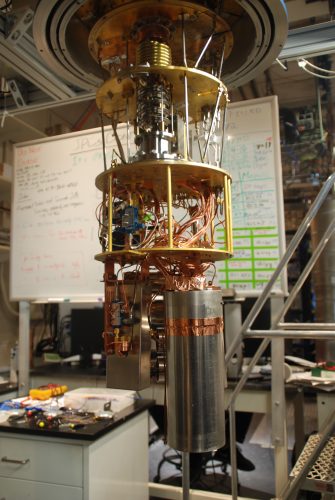Potentially the most powerful computing tool ever created, quantum computing technology is likely to continue to advance in the coming decades. What makes quantum technology special is its computational power, allowing it to have a wide range of applications. Among these are the ability to break RSA encryptions, which are used by many governments to encode information on a classical computer, and the ability to analyze vast amounts of data very quickly.
However, building a quantum computer is difficult because it poses the challenge of finding a system efficient for both quantum information processing and effective control of quantum states. Recently, a collaborative effort by the Schoelkopf Lab and Rakich Lab at the Yale Quantum Institute showed promise in using sound waves to store quantum information. Their method would increase efficiency and reduce production costs, which could cause major advances in the field of quantum computing.
For the last eighty years the world has relied on classical computers, which operate use values of zero and one to store information and solve problems that cannot be worked out by hand. Classical computers utilize two-state physical systems, like transducers or magnets, to define the complete physical state of a system, and then apply algorithms to manipulate those states to solve different problems.
Quantum computing breaks from the realm of classical computing by utilizing the fundamentals of quantum mechanics to encode information. For a quantum particle with two possible states, a particle is said to be in a superposition of both states, meaning the particle can be in both at the same time. Upon measurement, the particle randomly chooses one of these states.
These particles are called qubits, or quantum bits, and are quantum representations of a physical system. Just like a classical bit, a qubit is a piece of information that can be used in computation. However, instead of dealing with certainty, quantum physics deals with probabilities, and thus the state of the qubit is a probabilistic representation of the two possible states it could occupy. Using these odd probabilities, quantum computers can solve complex problems, including breaking computer encryptions to access secret data. The possibilities are endless.
Some of the most difficult challenges with quantum computing are maintaining a particular quantum state and finding a physical system that can be used to store quantum information. This is because quantum states are very fragile and are susceptible to change by any interaction with the environment around them.
In September, 2017, the Schoelkopf Lab and Rakich Lab at the Yale Quantum Institute announced their success using a simple-to-produce and very robust device that uses sound waves to store quantum information. The apparatus uses a piezoelectric transducer to couple the qubits to sound waves. The qubit system shows a dramatic increase in coherence timefrom previously demonstrated experiments, giving scientists more control and predictive power over the qubit.
Furthermore, the apparatus used to couple the qubits to sound waves is robust and requires relatively simple fabrication methods. “I think that our work demonstrates that it’s possible to couple superconducting quantum circuits and mechanical resonators in a simple and high performance way,” said Yiwen Chu, lead author of the recent breakthrough and a post-doctoral researcher in the Schoelkopf Lab. “This makes them accessible and robust enough to be used in more complex quantum devices in the future.”
This finding comes at an important and exciting time in the development of quantum mechanical applications. “Quantum computing is one of the main examples of how we can harness quantum mechanics to do something useful,” explains Chu. Much like other applications of physics, quantum mechanics is also undergoing that exciting transition from us being able to understand the physics to being able to build something useful.”
As quantum systems continue to become more complex and demonstrate more precise control of qubits, the ultimate goal of building a quantum computer will become more of a reality. Contributions like this will prove to be the key to its progression into a more mature and feasible application, making the once impossible computation and most difficult problems seem trivial.

